 Important Documents For Admission (2025 - 2026)
Important Documents For Admission (2025 - 2026)
| Degree Awarded | Discipline | Duration | Entry Level | Seats in IIST |
| B.Tech | CS -Data Science | 4 years | 10+2 | 60 |
Indore Institute of Science and Technology (IIST) offers a four-year under-graduate B. Tech. course in Data Science with an intake of 60 students. The course on data science covers the application of tools and techniques drawn from applied statistics, mathematics, and computer science to analyse extensive datasets, resulting in deeper insights and more informed decision-making across diverse domains. Students aspiring to achieve exceptional proficiency in data science and emerging technologies are encouraged to enrol in this course, as it will help them to excel professionally in this rapidly changing world of technology.
Experienced faculty specializing in distinct domains of data science, such as machine learning, data mining, natural language processing, and big data analytics, are ready to provide the students with both a solid theoretical foundation and practical competencies tailored to meet industry demands. Department of Data Science is equipped with state-of-the-art laboratories featuring high-speed internet and advanced computing facilities to ensure that students receive comprehensive practical training and hands-on learning experiences.
To ensure the holistic development of students, the department is committed to providing a multifaceted approach that encompasses various technical events, ranging from hackathons, internships, and project opportunities. Moreover, a rich assortment of co-curricular and extra-curricular activities, such as seminars, workshops, competitions and group discussions are incorporated to offer students diverse avenues for exploration, skill enhancement, and knowledge exchange. Through active participation in these initiatives, students can not only achieve technical proficiency but also valuable interpersonal and collaborative skills, preparing them comprehensively for their academic and professional pursuits.
PROGRAMME EDUCATIONAL OBJECTIVES (PEOs)
PEO1. Demonstrate technical competence in data science and develop solutions in core and interdisciplinary areas according to the needs of the society.
PEO2. Analyse, innovate and pursue research and development in the field of data science and Apply knowledge wisely for sustained employability.
PEO3. Communicate effectively, display leadership skills and demonstrate professionalism and ethical behaviour.
PROGRAMME SPECIFIC OUTCOMES (PSOs)
PSO 1: Demonstrate the understanding of computer science, computational mathematics, statistics, AI and data management techniques in the field of data science and showcase the global technical competence.
PSO 2: Design and develop effective solutions using data analytics, visualization, predictive modelling and machine learning techniques.
PSO 3: Apply the knowledge of diverse data science methodologies across a range of application domains and dynamic research fields.
PO 1: Apply the knowledge of mathematics, science, engineering fundamentals and engineering specialization for the solution of complex engineering problems.
PO 2: Identify, formulate and analyse challenging engineering problems using the basic concepts of mathematics and engineering sciences to achieve justified findings.
PO 3: Design and develop solutions/systems for challenging engineering problems that satisfy requirements while taking public health and safety, cultural, socioeconomic and environmental factors into account.
PO 4: To provide valid results and conclusions, use research-based methodologies including experiment design, data analysis and interpretation and information synthesis.
PO 5: Apply suitable methodologies and cutting-edge engineering and IT technologies, such as modelling and prediction for solving challenging engineering problems with the understanding of constraints and limitations.
PO 6: Analyse and solve social, cultural, ethical and health issues using knowledge acquired from the engineering domain.
PO 7: Understand how professional engineering solutions affect society and the environment and showcase the understanding of and commitment to sustainable development.
PO 8: Apply ethical principles and commit to professional ethics and responsibilities and norms of the engineering practice.
PO 9: Ability to function effectively as an individual, as a team member or leader and in multidisciplinary settings to achieve a common goal.
PO 10: Communicate effectively with the engineering community as well as the society about complex engineering problems. Communication includes generating effective reports and design documentation, effective presentations and clear instructions.
PO 11: Exhibit an awareness and comprehension of engineering and management concepts and apply them to one’s own work, as a team member and leader, in project management and in cross-disciplinary environments.
PO 12: Understand the importance of independent lifelong learning in the broader context of technological change and possess the necessary skills and knowledge to do so.
| Univ. Subject Code | Subject Name | CO Description |
| BT-201 | Engineering Physics | The Coursework is designed to provide students the opportunity to learn key concepts of Wave nature of particles and the Schrodinger equation. |
| Student will be able to understand the knowledge of Wave optics i.e. interference and diffraction. | ||
| To introduce the idea of solids like semiconductors (P type and N Type semiconductors), Diodes and Hall effect. STudents will also be able to understand the basic concept of superconductivity. | ||
| To develop the understanding of Lasers, fibre optics and their applications in field of engineering sciences. | ||
| To provide you to basic understanding of Electrostatics in vacuum. | ||
| BT-102 | Mathematics-I | To introduce the fallouts of Rolle’s Theorem that is fundamental to application of analysis to Engineering problems. |
| To introduce the idea of applying differential and integral calculus to notions of curvature and to improper integrals. Apart from some applications it gives a basic introduction on Beta and Gamma function | ||
| To develop the tool of power series and Fourier series for learning advanced Engineering Mathematics. | ||
| To familiarize the student with functions of several variables that is essential in most branches of engineering | ||
| To develop the essential tool of matrices and linear algebra in a comprehensive manner. | ||
| BT-203 | Basic Mechanical Engineering | Understand the properties of material, stress strain. Properties of alloys and cast iron. |
| Understand the concept measurement and machine tools their operations and their applications. | ||
| Understand the concept of fluid flow, properties of fluid, Bernoulli’s equation, Pascal’s law. | ||
| To Understand the concept of heat and temperature, law of thermodynamics, boilers and their mountings and accessories, basic Refrigeration cycles and its applications. | ||
| To Understand the working of different cycles and 4 strokes, 2 stroke engines and their applications. | ||
| BT-204 | Basic Civil Engineering & Mechanics | Students will acquire the basic knowledge in different fields of civil engineering and materials used in construction. |
| Gain the ability to use modern survey equipment to measure angles and distances. | ||
| Students will understand the basic of contour lines and map | ||
| Students will have the ability to identify, formulate and solve engineering problems related to Engineering Mechanics: Statics | ||
| Students will be able to analyse beam for shear force and bending moment. | ||
| BT-205 | Basic Computer Engineering | Able to understand the basic applications of computers in various fields, describe operating system, its role and functionalities and to apply concepts of MS word, MS power point, MS Excel efficiently. |
| Discuss and apply simple algorithms for arithmetic and logical problems. | ||
| Translate the algorithms to programs applying object-oriented concepts in C++ programming language. | ||
| Understand basics of computer networks, OSI layers and protocols, E commerce applications, impact of security threats and attacks on networking systems and also security measures | ||
| Understand the different method for representing and processing data and to get awareness about the impact of cloud computing, its various type of services. | ||
| BT-206 | Language Lab & Seminars | learners to develop good listening skills. |
| Encourages learner to talk freely and lose their shyness when talking in front of the people | ||
| To develop the overall personality of the students by the practical activities | ||
| Helps in confidence building, motivation to be more presentable and help in removing the stage fright | ||
| Develops speaking, writing, reading, listening and presentation skills. | ||
| BT-101 | Engineering Chemistry | Differentiate hard and soft water; solve the related numerical problems on water purification and its significance in industry and daily life. |
| Select the lubricant for various purposes based on the type of Machines. |
||
| Equipped with basic knowledge of polymer, methods of polymerization and various industrial applications of polymers |
||
| Draw the Phase diagrams of one & two component systems and causes, consequences and methods to minimize corrosion to improve industrial designs. | ||
| Identify the structure of unknown/new compounds with the help of spectroscopy and understand periodic properties such as ionization potential, oxidation states and electro negativity | ||
| BT-202 | Mathematics-II | To introduce effective mathematical tools for the solutions of ordinary and partial differential equations that model physical processes. |
| To introduce the tools of differentiation and integration of functions of complex variable those are used in various techniques dealing engineering problems. | ||
| To acquaint the student with mathematical tools available in vector calculus needed various field of science and engineering. | ||
| BT-103 | English for Communication | Effective use of verbal and non-verbal communication for enhanced soft skill beside enhanced reading comprehension as well |
| Write the different kinds of letters, reports and technical writing. | ||
| Apply basic rules of grammar in both written as well as oral communication. | ||
| BT-104 | Basic Electrical & Electronics Engineering | To introduce the concept of Basics of DC electrical Network including network theorems. |
| To introduce the concept of Basics of AC electrical Network(single phase & 3 phase).. | ||
| To study of law of Electromagnetism, introduction of transformer. | ||
| To study of various electrical Machines. | ||
| To study Basic Concept Digital Electronics. | ||
| BT-105 | Engineering Graphics | Draw various types of scales, and curves. |
| Draw orthographic projections of points & lines | ||
| Draw orthographic projections of Planes & Solids | ||
| Draw sections and development of solids including cylinders, cones, prisms and pyramids. | ||
| Draw isometric views of Planes and Solids, Drawing using AUTOCAD. | ||
| BT-106 | Manufacturing Practices | Use hand and power tools for different manufacturing processes |
| Operate machine tools while preparing any component | ||
| Select the appropriate tools required for specific operation. | ||
| Comprehend the safety measures required to be taken while using the tools. | ||
| Prepare Foundry, Fitting, Carpentry, Welding and smithy Job. | ||
| BT-107 | Internship-I (60 Hrs Duration) at the Institute level | Demonstrate the application of knowledge and skill sets acquired from the course and workplace in the assigned job function/s |
| Solve real life challenges in the workplace by analysing work environment and conditions, and selecting appropriate skill sets acquired from the course | ||
| Exhibit critical thinking and problem solving skills by analysing underlying issue/s to challenges | ||
| Demonstrate appreciation and respect for diverse groups of professionals by engaging harmoniously with different company stakeholders | ||
| Exhibit professional ethics by displaying positive disposition during internship | ||
| BT-108 | Swachh Bharat Summer Internship Unnat Bharat Abhiyan (100Hrs)/ Rural Outreach | This course is to sensitize students about the socio-cultural aspects of the rural areas parochial to their colleges. |
| Students are expected to observe, investigate and learn about the following aspects of the rural region: i. Demographics, Literacy, Geographical parameters of the Village; ii. Schemes of government of India and State of Madhya Pradesh in operation in the villages. | ||
| To enhance critical thinking by making them participate in social activities and imbibe human values among them. | ||
| Rural Swachh Bharat Abhiyan is to promote cleanliness and develop healthy habits in people in villages. | ||
| Unnat Bharat Abhiyan: To build an understanding of the development agenda within institutes of Higher Education and an institutional capacity and training relevant to national needs, especially those of rural India. |
| Semester | SIG’s on | Description | Outcome (Certificate/ Project etc) |
| I Sem | Logic Building & Basic Programming using C language | Able to Solve Programming Problems easy to average level | Preparation for earning Certificate |
| II Sem | Programming Basics using C/C++ Language | Able to Solve Programming Problems average to hard level | Earn Certificate |
| III Sem | Data Structures ALGOLUTION: Foundation of Data Structures and Algorithms | Able to Understand and Apply Data Structure Concept | Preparation for competitive Programming |
| PYTHON | OOP Concept helpful for Placements and implementation of branch specific utility | Earn Certificate | |
| IV Sem | Data Structures Algolution – Algorithmic Pinnacle – Navigating Complexity: | Able to Understand and Apply Data Structure Concept | Preparation for competitive Programming |
| Core JAVA | Able to Work in Frame Work | Earn Certificate | |
| V Sem | Algorithm Design Algolution – Evolution of Coding through Algorithms | Algorithm design & Application of DS | CODE VITA |
| PYTHON + Data Science | End to end machine learning and data science project development | Project | |
| VI Sem | SQL | Database Handling (Short Term SIG) | Project |
| Competitive Coding | Algorithm design & Application of DS | CODE VITA | |
| VII Sem | Skill up Crash Course for Placements | Brushing up all the important subjects for Placements including Apti | Placement Preparation Specific and General |
| Spring, Hibernate MEAN or MERN Stack, MOOC Course : EDX, COURSERA, NPTEL | Sharping and Specialization in at least one domain | Placement Preparation Specific and General | |
| VIII Sem | Skill up Crash Course for Placements | Brushing up all the important subjects for Placements including Apti | Placement Preparation Specific and General |
| MOOC Courses | Sharping and Specialization in at least one domain | Earn Placement and certification |
Artificial Intelligence presents a solid foundation in the principles and technologies that underlie many facets of AI, including logic, knowledge representation, probabilistic models, and machine learning. It teaches you to
Artificial Intelligence & Machine Learning is an emerging field which grows and changes very frequently. Fields like Machine Learning, Artificial Intelligence, Data Science, Internet of Things, Cloud Computing, Cyber Security etc. are growing exponentially. With this exponential growth in the recent years, there has been a steadily increasing demand for bright graduates to come in and help to transform areas ranging from data infrastructure to cyber security.
Self-learning is motivated in these special interest groups of the department. Various resources related to student interest are provided in the SIG labs. This learning is mentor by faculties and senior students to provide them an opportunity to work in team.
We provide certified skill courses on latest research areas and technologies through our special interest groups (SIG’s)
1. SIG- Artificial Intelligence: The overall purpose of artificial intelligence SIG is to apply different algorithms on raw data so as to allow computers and machines to function in an intelligent manner efficiently. And to evaluate and analyse the patterns of the data. Under this SIG, Students will get chance to implement these algorithm and create artificially intelligence systems.
2. SIG- Augmented and Virtual Reality: The purpose of VR/AR SIG is to understand artificial environment that is created with software for user perception and also to understand how AR works with real world image with extra layers of digital information and to gain better understanding of its wide range of applications.
3. SIG- iOS: Purpose of iOS SIG is to make students develop iOS Applications. With the amount of iPhones in the market, the need for iOS Apps also increases therefore this is the right platform for Students who want to build their career in Mobile app development as individual with their Creative ideas.
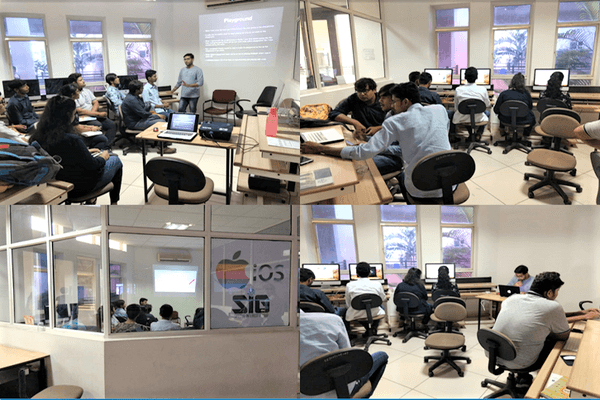
4. SIG- Database Management System: The purpose of DBMS SIG is to learn and practice software tools that organizes data that is to create, retrieve, update and manage data, in systematic way. Under this SIG trainings will be provided on software technologies like SQL, MySQL, Oracle Databases, NoSQL, MongoDB etc.
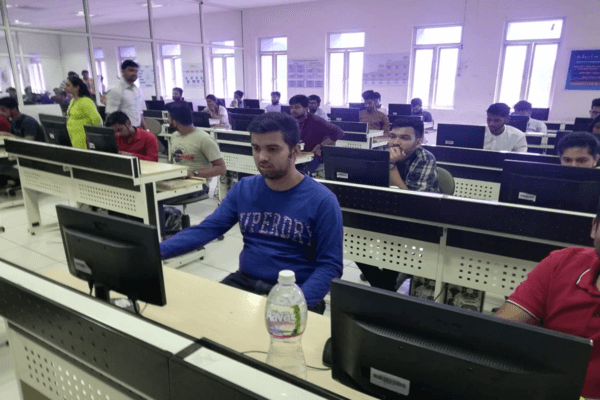
5. SIG- Android: Purpose of Android SIG is to make students understand Android App Development. In this SIG, students will learn the fundamentals of Kotlin, Google’s preferred programming language for Android and build interesting applications. Under this SIG training will be provided which will cover the Android components, tools and technologies like multi-screen Navigation, Android Studio, Intents, Fragments, Widgets, Layout and Ionic to build modern applications.
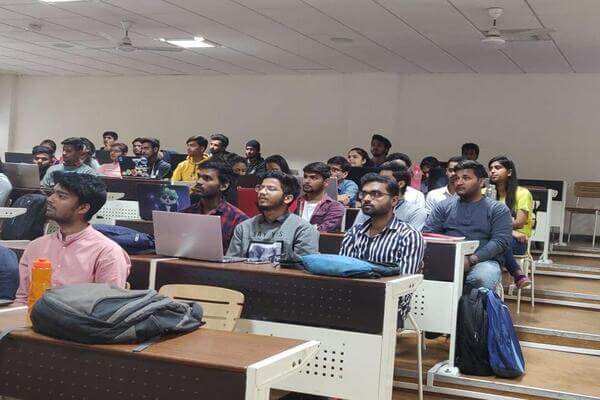
6. SIG- Internet of Things: The purpose is to train students for industry-level projects on IoT by: Organizing workshops/seminars/training/weekend activities for the students. IoT SIG facilitates with all the required equipments for practicising on different modules. These SIG Modules will help students to solve real-world problems and will encourage them to participate in various competitions across the country.
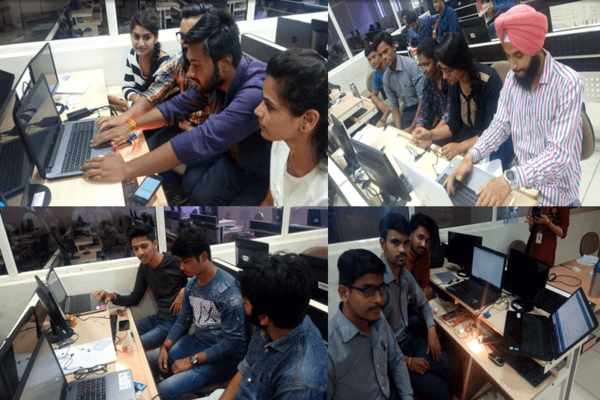
7. SIG- Hardware and Networking: Primary objective of this SIG is to build networking skill and creating a bridge to employment opportunities. Here the students are trained for international certifications like Microsoft, Cisco and Red Hat certifications. Students will learn hardware and operating systems for computer networks and train to upgrade troubleshoot and administer the system which will help them prepare for high-paying jobs. PC hardware/software installation, Networking technologies & concepts, Network administration, Cabling, Cisco router and switch configurations are the key skills focused in this SIG.
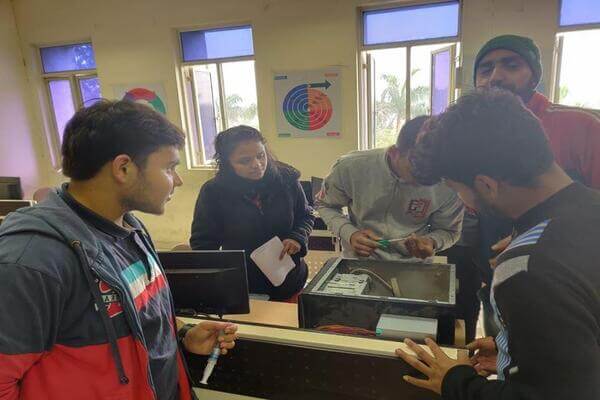
8. SIG- Data Analytics: The major purpose of Data Analytics SIG is to extract useful information from data and taking the decision based upon the data analysis or in simple words to create best out of waste. Here the students are trained to analyse different-different type of dataset and though that understand the pattern of informations that can be derived through that data. Hadoop, R and Python are some technologies which can be used to implement analytics.
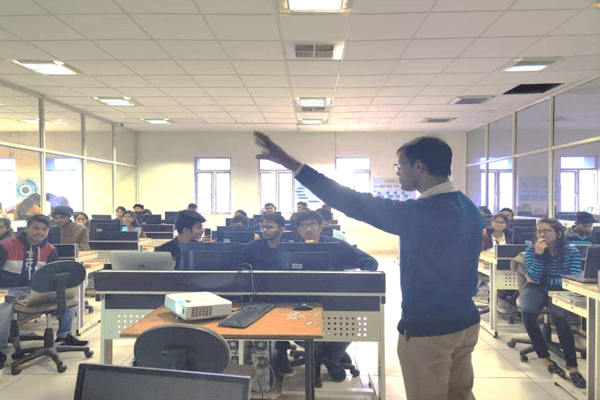
9. SIG- Cloud Computing: Cloud Computing curriculum prepare the students to pursue industry recognized certifications (AWS), and in-demand cloud jobs. In CC SIG, we train students by organizing workshops/seminars/internship. This helps learners explore cloud concepts, use cloud services, handling of security issues, and understand the architecture etc.
10. SIG- Web Development: Web development can range from developing a simple single static page of plain text to complex web-based internet applications (web apps), electronic businesses, and social network services. Web Development SIG gives an opportunity to the students to enhance their skill for web development platform.
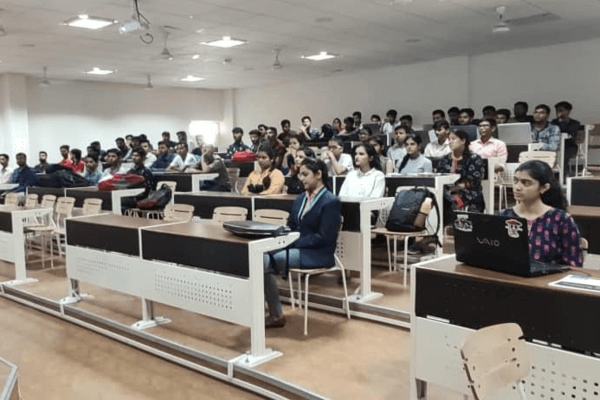
Department of CSE , IT & AIML is proud to be associated with Developer Student Clubs (DSC) with the selection of DSC lead from IIST. The DSC will conduct in-house training activities for the students to enable them to develop solutions for the local businesses.
IIST is proud to announce that we have been accepted into the AWS Academy program with Amazon Internet Services Private Limited (“AISPL”) and we are now authorized to administer and deliver the AWS Academy Cloud Computing Architecture curriculum.
Institute Instead Of Department Of CSE has signed an MoU with RedHat Academy to conduct in-house training on Core System Administration, Middleware Development, Cloud Computing along with Internships in live projects & certification.
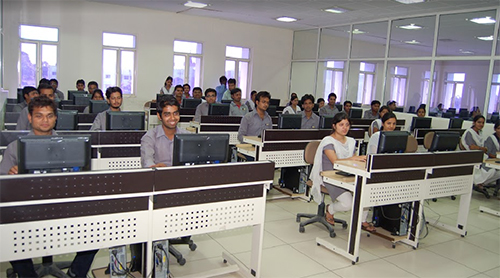
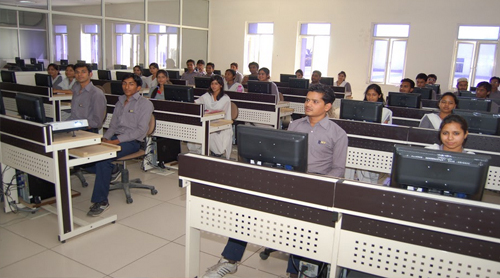
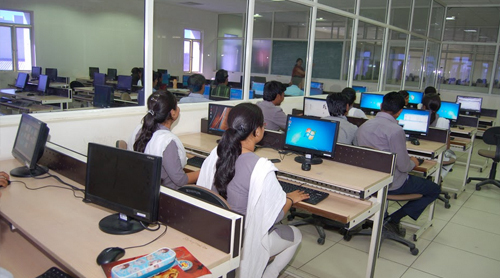
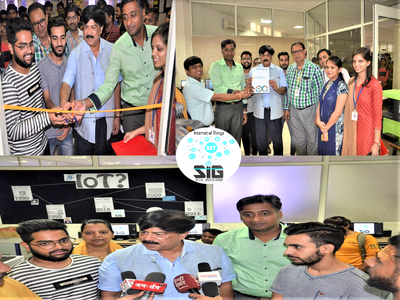
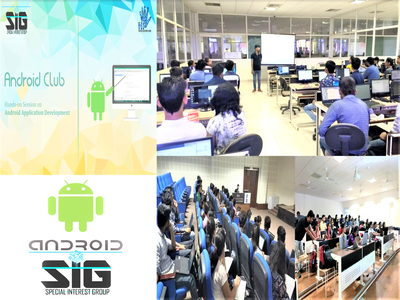
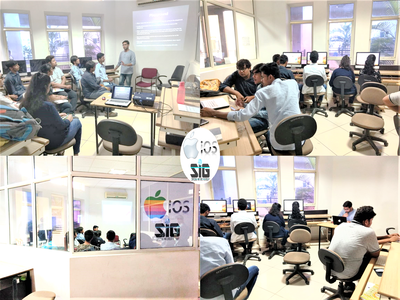
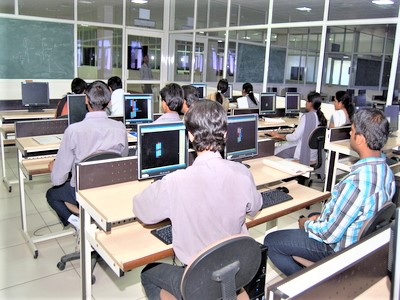
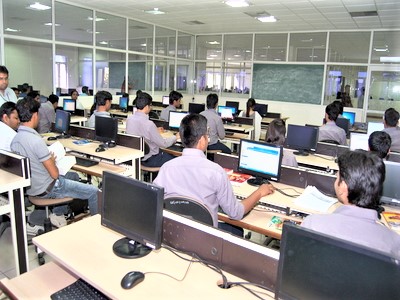
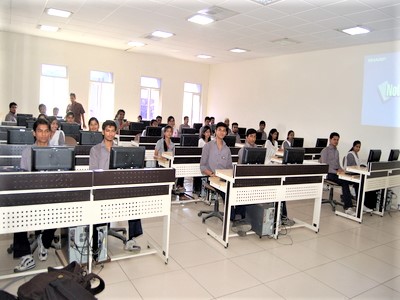
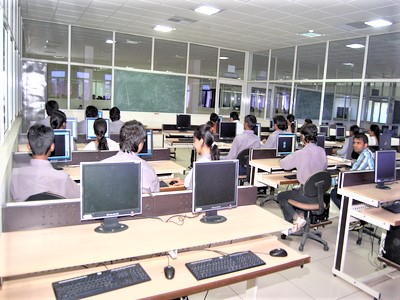
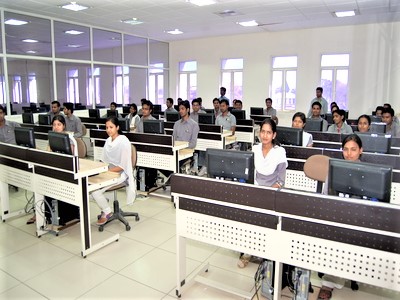
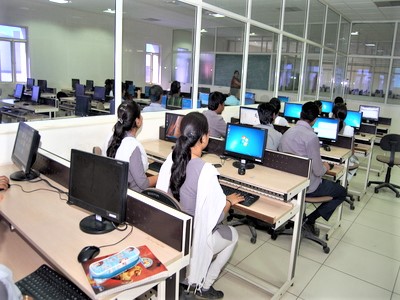
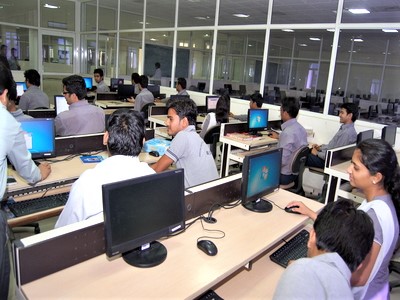
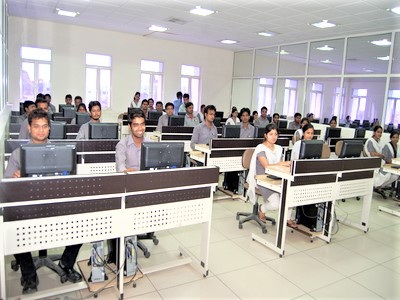
Computers are used in almost every aspect of life: automobile engines, microwave ovens, video games, watches, telephones, laptop computers, medical diagnostic equipment, commercial aircraft, and orbital satellites that deliver cable signals around the world. Computers have become tools that perform the immediate, but that’s not even quick enough. So, while the computer field is one of the fastest growing segments of industry today, it is also one of the fastest changing areas technologically.
Graduates with degrees in computer science or computer engineering might find themselves in a variety of environments – academia, research, industry, government, and private or not-for-profit organizations. On a daily basis, computer professionals are called on to analyze challenges, formulate and test solutions, use advanced communications or multimedia equipment, or work in teams for product development. The opportunities are enormous. However, an education in computer science and engineering does not stop with a college degree. It continues on the job or in the graduate school environment through seminars, conferences, advanced courses, and training.
There are a number of career opportunities available in Computer Science and Engineering sector. These opportunities are increasing exponentially day by day. Following are a few areas where CS aspirants can build their career –
| S.no. | Faculty Name | Paper Publication |
| Academic Year 21-22 | ||
| 1 | DR. RAJKUMAR JAIN | REGION BASED NODE ORGANIZATION WITH ENERGY EFFICIENT-MECHANISM-FOR-ON- DEMAND-ROUTING-PROTOCOL-IN-MOBILE AD-HOC NETWORK IN DOGO RANGSANG RESEARCH JOURNAL |
| 2 | DR. SATHISH KUMAR PENCHALA | STUDY ON NETWORK MODEL AND TRANSMISSION OF INFECTIOUS DISEASES IN HOSPITALS IN IJBPAS |
| 3 | DR. SATHISH KUMAR PENCHALA | SMART CITIES AND EMBEDDED IOT SENSOR SYSTEMS TO IMPROVE THE PERFORMANCE OF THE AUTOMATED ENVIRONMENT IN IJBPAS |
| 4 | DR. DHEERAJ RANE | STUDY ON NETWORK MODEL AND TRANSMISSION OF INFECTIOUS DISEASES IN HOSPITALS IN IJBPAS |
| 5 | DR. DHEERAJ RANE | SMART CITIES AND EMBEDDED IOT SENSOR SYSTEMS TO IMPROVE THE PERFORMANCE OF THE AUTOMATED ENVIRONMENT IN IJBPAS |
| 6 | MS. MARGI PATEL | GEDSET: AUTOMATIC DATASET BUILDER FOR MACHINE TRANSLATION SYSTEM WITH SPECIFIC REFERENCE TO GUJARATI-ENGLISH PRESENTED IN 11TH INTERNATIONAL ADVANCED COMPUTING CONFERENCE HELD ON 18TH & 19TH DECEMBER, 2021 AT UNIVERSITY OF MALTA, MALTA |
| 7 | MS. MARGI PATEL | GUJAGRA: AN ACYCLIC GRAPH TO UNIFY SEMANTIC KNOWLEDGE, ANTONYMS AND GUJARATI-ENGLISH TRANSLATION OF INPUT TEXT PRESENTED IN 4TH INTERNATIONAL CONFERENCE ON MACHINE INTELLIGENCE AND SIGNAL PROCESSING HELD IN MARCH 2022 |
| 8 | MS. MARGI PATEL | DSETGENS: AN AUTOMATED TECHNIQUE FOR BUILDING DATASET FROM SPEECH WITH RESPECT TO GUJARATI-ENGLISH PRESENTED IN 11 IEEE INTERNATIONAL CONFERENCE ON COMMUNICATION SYSTEM AND NETWORK TECHNOLOGIES (CSNT) 2022 HELD IN APRIL 2022 |
| 9 | MS. MARGI PATEL | FUTURE ASPECTS OF ARTIFICIAL INTELLIGENCE IN GIS SCIENCE JOURNAL |
| 10 | MS. ALPANA MEENA | FUTURE ASPECTS OF ARTIFICIAL INTELLIGENCE IN GIS SCIENCE JOURNAL |
| 11 | MR. PRADEEP BANIYA | REGION AND ANGLE BASED NODE ORGANIZATION LOCATION UPDATE IN MOBILE AD-HOC NETWORKS IN DOGO RANGSANG RESEARCH JOURNAL |
| 12 | MR. PRADEEP BANIYA | MULTI-FUNCTION E-SCARECROWKAAG BHAGODA SMART-FARMING AND CROP SAFETY WITH IOT/AI IN DOGO RANGSANG RESEARCH JOURNAL |
| 13 | MR. PRITESH SAKLECHA | PLAN AND DEVELOPMENT OF SMART MIRROR DISPLAYING REAL-TIME SENSOR DATA USING RASPBERRY PI IN JOURNAL OF EDUCATION: RABINDRA BHARATI UNIVERSITY |
| 14 | MS. NEHA TALREJA | PLAN AND DEVELOPMENT OF SMART MIRROR DISPLAYING REAL-TIME SENSOR DATA USING RASPBERRY PI IN JOURNAL OF EDUCATION: RABINDRA BHARATI UNIVERSITY |
| 15 | MR.AMIT GOUD | MULTI-FUNCTION E-SCARECROWKAAG BHAGODA SMART-FARMING AND CROP SAFETY WITH IOT/AI IN DOGO RANGSANG RESEARCH JOURNAL |
| 16 | MS. DIPTI REGE | REGION AND ANGLE BASED NODE ORGANIZATION LOCATION UPDATE IN MOBILE AD-HOC NETWORKS IN DOGO RANGSANG RESEARCH JOURNAL |
| Academic Year 22-23 | ||
| 1 | DR. SATHISH KUMAR PENCHALA | ROLES AND FUTURE OF THE INTERNET OF THINGS – BASED SMART HEALTH CARE MODELS PRESENTED IN 2023 |
| 2 | DR. SATHISH KUMAR PENCHALA | ENERGY EFFICIENT DATA TRANSMISSION IN WIRELESS SENSOR NETWORK USING CROSS SITE LEAPING ALGORITHM PRESENTED IN INTERNATIONAL CONFERENCE ON COMPUTATIONAL INTELLIGENCE AND COMPUTING APPLICATIONS-21 IN 2022 |
| 3 | DR. DHEERAJ RANE | THE PATH OF RURAL INDUSTRY REVITALIZATION BASED ON IMPROVED GENETIC ALGORITHM IN THE INTERNET ERA PRESENTED IN COMPUTATIONAL INTELLIGENCE AND NEUROSCIENCE IN 2022 |
| 4 | DR. DHEERAJ RANE | NEXT GEENRATION OPTIMIZATION MODELS AND ALGORITHMS IN CLOUD AND FOG COMPUTING VERTULIZATION SECURITY: THE PRESENT STATE AND FUTURE PRESENTED IN SCIENTIFIC PROGRAMMING IN 2022 |
| 5 | DR. MARGI PATEL | AN INTEGRATED APPROCH TO ANALYZING AND MEASURING WHEATHER DATA FOR WHEATHER FORCAST PREDICTION PRESENTED IN 3RD INTERNATIONAL CONFERENCE ON ARTIFICIAL INTELLIGENCE, 5G COMMUNICATIONS AND NETWORK TECHNOLOGIES IN 2023 |
| 6 | DR. MARGI PATEL | AGE AND GENDER RECOGNITION USING DEEP LEARNING TECHNIQUE PRESENTED IN 3RD INTERNATIONAL CONFERENCE ON SMART DATA INTELLIGENCE (ICSMDI) 2023, KONGUNADU COLLEGE OF ENGINEERING AND TECHNOLOGY IN 2023 |
| Academic Year 23-24 | ||
| 1 | MR. NISHANT VIJAYWARGI | A COMPRIHENSIVE STUDY ON MACHINE LEARNING BASED APPROACHES FOR OBJECT DETECTION VOLUME 12 ISSUE 5 IN 2023 |
| 2 | DR SHWETA AGRAWAL | A SYSTEMATIC REVIEW ON DEEP LEARNING‐BASED AUTOMATED CANCER DIAGNOSIS MODELS, JOURNAL OF CELLULAR AND MOLECULAR MEDICINE, |
| 3 | DR SHWETA AGRAWAL | ROBUST CONTROL OF FREQUENCY CONSIDERING OPERATIONS OF AC MICROGRID IN ISLANDED MODE, INDERSCIENCE INTERNATIONAL JOURNAL OF ENGINEERING SYSTEMS MODELING AND SIMULATION. |
| 4 | DR. MARGI PATEL | SOFTWARE ARCHITECTURE SURVEY FROM AN EDGE COMPUTING PERSPECTIVE” PRESENTED IN 1ST INTERNATIONAL CONFERENCE ON COGNITIVE, GREEN AND UBIQUITOUS COMPUTING (IC-CGU), C V RAMAN GLOBAL UNIVERSITY, ODISHA DURING 1-2 MARCH IS NOW ONLINE AND AVAILABLE ON IEEE XPLORE (HTTPS://IEEEXPLORE.IEEE.ORG/DOCUMENT/10530838) |
| 5 | DR. MARGI PATEL | TOOTH SEGMENTATION AND DETECTION USING U-NET AND ATTENTION-BASED U-NET TECHNIQUE PERSENTED IN IEEE SPONSORED INTERNATIONAL CONFERENCE ON MULTIDISCIPLINARY RESEARCH IN TECHNOLOGY AND MANAGEMENT (MRTM 2023) 22-23 SEPT 2023 |
| 7 | MR. VIVEK GUPTA | PREDICTION-BASED LEARNING TO ENHANCE THE AI ESSENSIALITIES ON THE STEPS OF CROP FARMING PRESENTED & PUBLISHED IN NATIONAL CONFERENCE ON ADVANCE ENGINEERING FRONTIERS: INNOVATION, CHALLENGES AND SOLUTION 2024 |
| 8 | MR. VIVEK GUPTA | A REVIEW OF SOYABEAN CROP CLASSIFICATIONAND DISEASES IDENTIFICATIONSUSING AI LEARNING AND IOT BASED MODELS IN 15th IEEE INTERNATIONAL CONFERENCE ON COMPUTING COMMUNICATION NETWORK TECHNOLOGIES 2024 |
| 9 | DR RICHA T GUPTA | PREDICTION-BASED LEARNING TO ENHANCE THE AI ESSENSIALITIES ON THE STEPS OF CROP FARMING PUBLISHED IN NATIONAL CONFERENCE ON ADVANCE ENGINEERING FRONTIERS: INNOVATION, CHALLENGES AND SOLUTION 2024 |